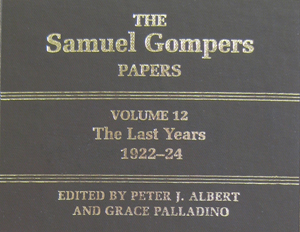 For the first time since 1981—the year President Ronald Reagan famously broke the Professional Air Traffic Controllers strike—organized labor is back in the news. And this time the headlines are just as discouraging. In Wisconsin, Ohio, and New Jersey, collective-bargaining rights are under attack. In Maine and Missouri, child labor is making a comeback. Even in Montgomery County, Maryland, probably the most reliably liberal section of the state, arbitration awards are being revoked. Despite vigorous and united protests, union members haven’t been able to turn things around, probably because they represent less than 12 percent of the nation’s wage earners. That’s about the same proportion they represented a century ago, when Samuel Gompers led the American Federation of Labor, which raises the question: Would Gompers be turning in his grave today or would he be saying “I told you so?”
For the first time since 1981—the year President Ronald Reagan famously broke the Professional Air Traffic Controllers strike—organized labor is back in the news. And this time the headlines are just as discouraging. In Wisconsin, Ohio, and New Jersey, collective-bargaining rights are under attack. In Maine and Missouri, child labor is making a comeback. Even in Montgomery County, Maryland, probably the most reliably liberal section of the state, arbitration awards are being revoked. Despite vigorous and united protests, union members haven’t been able to turn things around, probably because they represent less than 12 percent of the nation’s wage earners. That’s about the same proportion they represented a century ago, when Samuel Gompers led the American Federation of Labor, which raises the question: Would Gompers be turning in his grave today or would he be saying “I told you so?”
One of the founding fathers of the American labor movement and the nation’s leading labor statesmen in the late 19th and early 20th centuries, Samuel Gompers never underestimated the critical value of political power and support. As AFL president between 1886 and 1924 he spent years lobbying state, local and federal representatives to improve work place safety, promote the eight-hour day, prohibit tenement-house workshops, regulate immigration, and secure labor’s right to organize (a right that wasn’t won until 1935, a decade after his death). But Gompers was a realist: He knew that labor’s political voice was only as strong as its economic power, so what he called “thorough” organization came first. “Wherever trade unions . . . are most firmly organized,” he wrote in 1885, “there are the rights of the people most respected,” a position he maintained for the rest of his life.
A strong believer in education and self-help, Gompers urged wage-earners to look to each other—not to the government—to improve their lot, and to learn how to move forward by actively participating in union business. The very process of organizing, identifying interests, and then fighting for rights, developed an “invaluable spirit of independence and self-responsibility,” he argued, “that really makes for progress and betterment.” It was one thing to seek political help when it came to protecting child laborers or abolishing the labor injunction, but quite another to cede control of industrial relations to politicians, friendly or not. As far as Gompers could see, relying on government to secure fair wages and decent conditions only fostered a spirit of paternalism and dependency that would weaken labor at its roots. “Unless the working people are organized to express their desires and needs” he said, “any other method tends to weaken initiative.”
No doubt Gompers would have been pleased to see the growth in today’s public employee unions. In his day, these workers had no right to organize, as Boston’s police force learned the hard way in 1919. But he certainly would have been disappointed, and perhaps gravely so, to realize that private sector unions had not kept up. As of 2010, less than 7 percent of private sector employees belonged to unions, versus 36 percent of the public work force—which means the vital core of today’s labor movement rests on the good-will of friendly politicians. That doesn’t bode well for the future; as we have seen over the last two years, political friendship does not count for much when government deficits are rising and tax increases are off the table.
Considering these circumstances, perhaps it’s time to revisit Samuel Gompers and the ideas he developed through a life time of struggle. After all, despite labor legislation like the Wagner Act and the Fair Labor Standards Act, in the 1930s, and Executive Orders that empowered public sector unions in the 1960s, in 2011 workers’ bargaining power is at all-time low, and so is their share of the national income. “Grit your teeth and organize,” Gompers roared a century ago, advice that seems particularly pertinent today.
*****
Grace Palladino is codirector (with Peter J. Albert) of the Samuel Gompers Papers and a member of the history faculty at the University of Maryland. The Samuel Gompers Papers, Volume 12: The Last Years, 1922-24 was just published by the University of Illinois Press.
